Landing Page
Featured story slideshow, master of fine arts in creative writing & poetics.
Image: LaTasha N. Nevada Diggs performing the opening keynote at the 2019 Fall Convergence

UW Bothell: Where Writers and Artists Converge
Find your voice as a writer while inquiring into the social, cultural and technological aspects of writing. How is writing an ethical, political and aesthetic endeavor?
Our students experiment across genres and are encouraged to extend their practice beyond the page, drawing upon media, art and performance.
Our unique curriculum includes workshops, seminars and opportunities to participate in readings, conferences and festivals.
Earn your degree with flexible evening classes designed for working professionals. Join a creative community and gain valuable skills for a vibrant writing career.
Learn more about our program below.
Explore the UW Difference
Designed for.
Writers who want to join a supportive community of literary peers and gain the credentials to work in diverse industries or teach at the college level
Program Highlights
- Experimental writing, hybrid forms and performance
- Critical thinking about contemporary literature and art
- Exploration across genres and media
- Hands-on collaboration with faculty
- Visiting writers and artists
- Connection with Seattle’s thriving literary community
Degree You'll Earn
Master of Fine Arts in Creative Writing & Poetics
Program Length
2 years / 6 quarters
When Classes Meet
Evenings; part-time and full-time options available
Autumn 2024 Application Deadline
February 1, 2024
Our Faculty
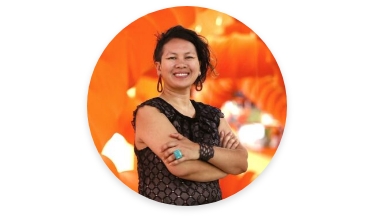
Anida Yoeu Ali
Senior Artist-in-Residence
Investigates the artistic, spiritual and political collisions of a hybrid transnational identity
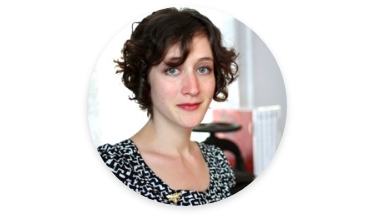
Amaranth Borsuk
MFA Program Director Associate Professor
Works at the intersection of print and digital media
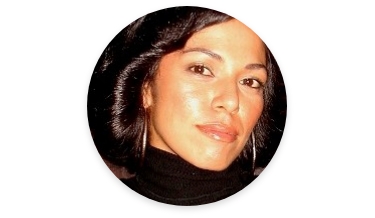
Naomi Macalalad Bragin
Associate Professor
Dancer, writer and performance ethnographer
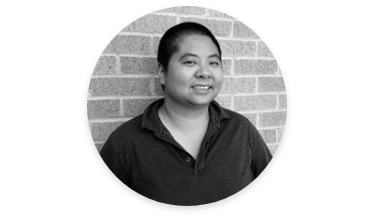
Ching-In Chen
Assistant Professor
Hybrid writer, community organizer and performer
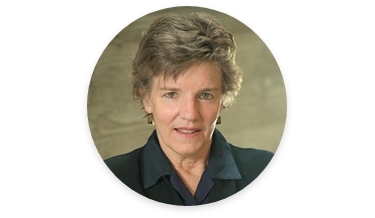
Jeanne Heuving
Founding Director
Teaches classes in creative writing and poetics, literature and cultural studies
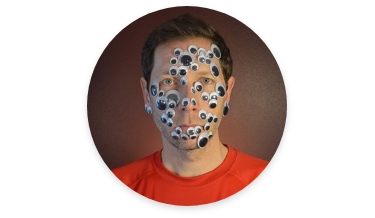
Ted Hiebert
Seattle-based interdisciplinary artist and theorist
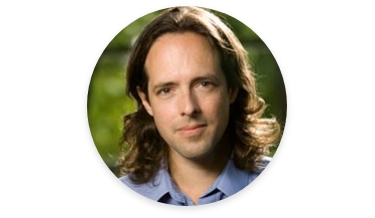
Joe Milutis
Writer and media artist
Outcomes Worth the Investment
Alumni accomplishments.
MFA alumni go on to publish their work, found literary journals and small presses, study in doctoral programs and build literary communities in Seattle and beyond. Here are some recent stories:
- MFA's Talena Lachelle Queen’s new exhibit at Paterson Museum
- MFA alumni Amy Hirayama and Emily Mundy teach workshops in somatic exploration
- MFA alum Troy Landrum Jr. selected as Wa Na Wari Fellow
Average annual salary for writers and authors in Washington state in 2022
Projected annual job growth for writers and authors in Washington state (2020–30), which is much faster-than-average job growth
* Source: O*Net Online
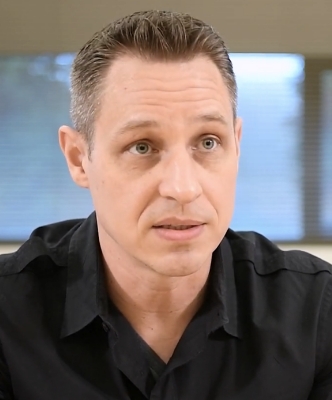
“ Having other people come from an experimental poetry section, which I didn’t even know was a thing. And then also Filipino mythology and folklore, and people who are brilliant poets who use sound poetry — how the words sound and feel in your mouth as opposed to how they look on the page. Experiencing all these different artistic approaches was phenomenal. It was absolutely worth every second I could spend in class to learn .”
TERRELL FOX
Creative Writer, Editor, Mediator and Leader Alumnus, Master of Fine Arts in Creative Writing & Poetics
Brought to you by UW Continuum College
© 2024 University of Washington | Seattle, WA
- Mission, Values, and Goals
- Diversity Plan
- Scholarship
- How to apply
- American & Ethnic Studies
- Community Psychology
- Conservation & Restoration Science
- Culture, Literature & the Arts
- Data Visualization
- Earth System Science
- Environmental Science
- Environmental Studies
- Gender, Women & Sexuality Studies
- Global Studies
- Interactive Media Design
- Interdisciplinary Arts
- Interdisciplinary Studies
- Law, Economics & Public Policy
- Mathematical Thinking & Visualization
- Media & Communication Studies
- Science, Technology & Society
- Society, Ethics & Human Behavior
- Degree Maps
- Minor in Creative Writing
- Minor in Diversity
- Minor in Ecological Restoration
- Minor in Gender, Women & Sexuality Studies
- Minor in Geographic Information System
- Minor in Human Rights
- Minor in Performance
- Minor in Policy Studies
- Minor in Science, Technology & Society
- Minor in Visual & Media Arts
- Learning Objectives
- Student Feedback
- Petitions and Forms
- Grade Appeal
- Grievances and Complaints
- IAS Degree Portfolio
- Credit Based Learning
- Community Engagement
- D.C. Human Rights Seminar
- Study Abroad
- Global Scholars
- How to Apply
- Thesis Work
- Fall Convergence
- Spring Festival
- MFA Publications
- About Cultural Studies
- Cultural Studies: Starting Points
- Graduate Research Conference
- Why Policy Studies?
- Prospective Students
- Graduate Admissions
- Finding an Internship Site
- For Internship Sites
- For Faculty
- Registration
- On leave and withdrawal
- Satisfactory Performance and Progress
- Petitions and forms
- Campus Resources
- Incoming Students
- Technology Resources and Support
- Educational Access & Opportunity Fund
- Global Scholars Fund
- Experiential & Community Based Learning Fund
- Academic Excellence & Emerging Initiatives Fund
- Diane and Mike Gillespie Community Action Fund
- Nony Clark Milmoe Scholarship
- Sandra Martin Roberts Memorial Scholarship
- Washington D.C. Travel Assistance Fund
- Graduate Studies Excellence Fund
- Master of Fine Arts (MFA) Program Fund
- American Muslim Research Institute Fund
- All IAS Funds
Quick Links
- Information Technology
- Commuter Services
- Human Resources
- Campus Safety
Creative Writing & Poetics (MFA)
Writing Changes
The Master of Fine Arts in Creative Writing & Poetics at the University of Washington Bothell is dedicated to helping each student develop their creative work through a course of study that encourages exploration and discovery.
We organize our curriculum into areas of inquiry rather than genres. In contrast to many MFA programs, our writers enjoy the freedom to experiment across genres and media as suits their creative purposes. Emphasizing experimentation and hybridity, our program invites students to participate in a community concerned with the pursuit of creative writing in a rapidly changing society.
The MFA poses the central questions of poetics, inquiring into the social, cultural, and technological aspects of writing to ask: How is creative writing an ethical, political and aesthetic endeavor? What forms might creative writing take in an interconnected, transnational society? How does new media alter the environment and possibilities for creative writing?
Each academic year kicks off with the Fall Convergence , a gathering of nationally and internationally renowned writers and artists to engage topics in contemporary poetics. The year closes with the Spring Festival , where graduating students share their thesis work publicly and receive a benedictory reading from a student-nominated invited speaker.
Program Highlights
- Focus on experimental writing and hybrid forms
- Vibrant roster of visiting writers, conferences, and festivals
- Evening program designed for students with jobs and other commitments
- Optional residency in second year
- Flexible part-time or full-time thesis completion
- Connections to Seattle’s thriving literary and arts scene
Interested in Learning More?
Contact us at [email protected]
We use cookies to enhance the user experience on our website and deliver our services. We also use cookies to show you relevant advertising. Read the UW Privacy Policy and more about our use of cookies .
- Programs & Courses
- Entire Site
Master of Fine Arts in Creative Writing & Poetics, UW Bothell
Degree details.
- Location: UW Bothell
- Time of Day: Evenings
- Duration: 2 years (part or full time)
Next Start Date
September 2024
About this Degree
Experiment with different genres, and explore the interconnections among multiple art forms. Inquire into the social, cultural and technological aspects of the written arts at this historic moment. Study with nationally and internationally recognized writers and artists, and earn your MFA.
For more information, see the UW Bothell Master of Fine Arts in Creative Writing & Poetics website.
related offerings
Developmental editing.
Learn developmental editing skills by working on manuscripts, book proposals, article pitches and letters to the author.
Talk to an Enrollment Coach
Our coaches are here to help you every step of the way — from finding a program to applying and enrolling. Start the conversation!
By submitting my information, I consent to be contacted and agree to the privacy policy .
Subscribe to Keep Learning!
Be among the first to get timely program info, career tips, event invites and more.
By submitting my information, I consent to be contacted and agree to the terms and conditions outlined in the privacy policy .
- Best Colleges
- Application Advice

- Hidden Gem Colleges
The 10 Best Creative Writing MFA Programs in the US
The talent is there.
But the next generation of great American writers needs a collegial place to hone their craft.
They need a place to explore the writer’s role in a wider community.
They really need guidance about how and when to publish.
All these things can be found in a solid Master of Fine Arts in Creative Writing degree program. This degree offers access to mentors, to colleagues, and to a future in the writing world.
A good MFA program gives new writers a precious few years to focus completely on their work, an ideal space away from the noise and pressure of the fast-paced modern world.
We’ve found ten of the best ones, all of which provide the support, the creative stimulation, and the tranquility necessary to foster a mature writer.
We looked at graduate departments from all regions, public and private, all sizes, searching for the ten most inspiring Creative Writing MFA programs.
Each of these ten institutions has assembled stellar faculties, developed student-focused paths of study, and provide robust support for writers accepted into their degree programs.
To be considered for inclusion in this list, these MFA programs all must be fully-funded degrees, as recognized by Read The Workshop .
Creative Writing education has broadened and expanded over recent years, and no single method or plan fits for all students.
Today, MFA programs across the country give budding short story writers and poets a variety of options for study. For future novelists, screenwriters – even viral bloggers – the search for the perfect setting for their next phase of development starts with these outstanding institutions, all of which have developed thoughtful and particular approaches to study.
So where will the next Salinger scribble his stories on the steps of the student center, or the next Angelou reading her poems in the local bookstore’s student-run poetry night? At one of these ten programs.
Here are 10 of the best creative writing MFA programs in the US.
University of Oregon (Eugene, OR)

Starting off the list is one of the oldest and most venerated Creative Writing programs in the country, the MFA at the University of Oregon.
Longtime mentor, teacher, and award-winning poet Garrett Hongo directs the program, modeling its studio-based approach to one-on-one instruction in the English college system.
Oregon’s MFA embraces its reputation for rigor. Besides attending workshops and tutorials, students take classes in more formal poetics and literature.
A classic college town, Eugene provides an ideal backdrop for the writers’ community within Oregon’s MFA students and faculty.
Tsunami Books , a local bookseller with national caché, hosts student-run readings featuring writers from the program.
Graduates garner an impressive range of critical acclaim; Yale Younger Poet winner Brigit Pegeen Kelly, Cave Canem Prize winner and Guggenheim fellow Major Jackson, and PEN-Hemingway Award winner Chang-Rae Lee are noteworthy alumni.
With its appealing setting and impressive reputation, Oregon’s MFA program attracts top writers as visiting faculty, including recent guests Elizabeth McCracken, David Mura, and Li-young Lee.
The individual approach defines the Oregon MFA experience; a key feature of the program’s first year is the customized reading list each MFA student creates with their faculty guide.
Weekly meetings focus not only on the student’s writing, but also on the extended discovery of voice through directed reading.
Accepting only ten new students a year—five in poetry and five in fiction— the University of Oregon’s MFA ensures a close-knit community with plenty of individual coaching and guidance.
Cornell University (Ithaca, NY)

Cornell University’s MFA program takes the long view on life as a writer, incorporating practical editorial training and teaching experience into its two-year program.
Incoming MFA students choose their own faculty committee of at least two faculty members, providing consistent advice as they move through a mixture of workshop and literature classes.
Students in the program’s first year benefit from editorial training as readers and editors for Epoch , the program’s prestigious literary journal.
Teaching experience grounds the Cornell program. MFA students design and teach writing-centered undergraduate seminars on a variety of topics, and they remain in Ithaca during the summer to teach in programs for undergraduates.
Cornell even allows MFA graduates to stay on as lecturers at Cornell for a period of time while they are on the job search. Cornell also offers a joint MFA/Ph.D. program through the Creative Writing and English departments.
Endowments fund several acclaimed reading series, drawing internationally known authors to campus for workshops and work sessions with MFA students.
Recent visiting readers include Salman Rushdie, Sandra Cisneros, Billy Collins, Margaret Atwood, Ada Limón, and others.
Arizona State University (Tempe, AZ)

Arizona State’s MFA in Creative Writing spans three years, giving students ample time to practice their craft, develop a voice, and begin to find a place in the post-graduation literary world.
Coursework balances writing and literature classes equally, with courses in craft and one-on-one mentoring alongside courses in literature, theory, or even electives in topics like fine press printing, bookmaking, or publishing.
While students follow a path in either poetry or fiction, they are encouraged to take courses across the genres.
Teaching is also a focus in Arizona State’s MFA program, with funding coming from teaching assistantships in the school’s English department. Other exciting teaching opportunities include teaching abroad in locations around the world, funded through grants and internships.
The Virginia C. Piper Center for Creative Writing, affiliated with the program, offers Arizona State MFA students professional development in formal and informal ways.
The Distinguished Writers Series and Desert Nights, Rising Stars Conference bring world-class writers to campus, allowing students to interact with some of the greatest in the profession. Acclaimed writer and poet Alberto Ríos directs the Piper Center.
Arizona State transitions students to the world after graduation through internships with publishers like Four Way Books.
Its commitment to the student experience and its history of producing acclaimed writers—recent examples include Tayari Jones (Oprah’s Book Club, 2018; Women’s Prize for Fiction, 2019), Venita Blackburn ( Prairie Schooner Book Prize, 2018), and Hugh Martin ( Iowa Review Jeff Sharlet Award for Veterans)—make Arizona State University’s MFA a consistent leader among degree programs.
University of Texas at Austin (Austin, TX)

The University of Texas at Austin’s MFA program, the Michener Center for Writers, maintains one of the most vibrant, exciting, active literary faculties of any MFA program.
Denis Johnson D.A. Powell, Geoff Dyer, Natasha Trethewey, Margot Livesey, Ben Fountain: the list of recent guest faculty boasts some of the biggest names in current literature.
This three-year program fully funds candidates without teaching fellowships or assistantships; the goal is for students to focus entirely on their writing.
More genre tracks at the Michener Center mean students can choose two focus areas, a primary and secondary, from Fiction, Poetry, Screenwriting, and Playwriting.
The Michener Center for Writers plays a prominent role in contemporary writing of all kinds.
The hip, student-edited Bat City Review accepts work of all genres, visual art, cross genres, collaborative, and experimental pieces.
Recent events for illustrious alumni include New Yorker publications, an Oprah Book Club selection, a screenwriting prize, and a 2021 Pulitzer (for visiting faculty member Mitchell Jackson).
In this program, students are right in the middle of all the action of contemporary American literature.
Washington University in St. Louis (St. Louis, MO)

The MFA in Creative Writing at Washington University in St. Louis is a program on the move: applicants have almost doubled here in the last five years.
Maybe this sudden growth of interest comes from recent rising star alumni on the literary scene, like Paul Tran, Miranda Popkey, and National Book Award winner Justin Phillip Reed.
Or maybe it’s the high profile Washington University’s MFA program commands, with its rotating faculty post through the Hurst Visiting Professor program and its active distinguished reader series.
Superstar figures like Alison Bechdel and George Saunders have recently held visiting professorships, maintaining an energetic atmosphere program-wide.
Washington University’s MFA program sustains a reputation for the quality of the mentorship experience.
With only five new students in each genre annually, MFA candidates form close cohorts among their peers and enjoy attentive support and mentorship from an engaged and vigorous faculty.
Three genre tracks are available to students: fiction, poetry, and the increasingly relevant and popular creative nonfiction.
Another attractive feature of this program: first-year students are fully funded, but not expected to take on a teaching role until their second year.
A generous stipend, coupled with St. Louis’s low cost of living, gives MFA candidates at Washington University the space to develop in a low-stress but stimulating creative environment.
Indiana University (Bloomington, IN)

It’s one of the first and biggest choices students face when choosing an MFA program: two-year or three-year?
Indiana University makes a compelling case for its three-year program, in which the third year of support allows students an extended period of time to focus on the thesis, usually a novel or book-length collection.
One of the older programs on the list, Indiana’s MFA dates back to 1948.
Its past instructors and alumni read like the index to an American Literature textbook.
How many places can you take classes in the same place Robert Frost once taught, not to mention the program that granted its first creative writing Master’s degree to David Wagoner? Even today, the program’s integrity and reputation draw faculty like Ross Gay and Kevin Young.
Indiana’s Creative Writing program houses two more literary institutions, the Indiana Review, and the Indiana University Writers’ Conference.
Students make up the editorial staff of this lauded literary magazine, in some cases for course credit or a stipend. An MFA candidate serves each year as assistant director of the much-celebrated and highly attended conference .
These two facets of Indiana’s program give graduate students access to visiting writers, professional experience, and a taste of the writing life beyond academia.
University of Michigan, Ann Arbor (Ann Arbor, MI)

The University of Michigan’s Helen Zell Writers’ Program cultivates its students with a combination of workshop-driven course work and vigorous programming on and off-campus. Inventive new voices in fiction and poetry consistently emerge from this two-year program.
The campus hosts multiple readings, events, and contests, anchored by the Zell Visiting Writers Series. The Hopgood Awards offer annual prize money to Michigan creative writing students .
The department cultivates relationships with organizations and events around Detroit, so whether it’s introducing writers at Literati bookstore or organizing writing retreats in conjunction with local arts organizations, MFA candidates find opportunities to cultivate a community role and public persona as a writer.
What happens after graduation tells the big story of this program. Michigan produces heavy hitters in the literary world, like Celeste Ng, Jesmyn Ward, Elizabeth Kostova, Nate Marshall, Paisley Rekdal, and Laura Kasischke.
Their alumni place their works with venerable houses like Penguin and Harper Collins, longtime literary favorites Graywolf and Copper Canyon, and the new vanguard like McSweeney’s, Fence, and Ugly Duckling Presse.
University of Minnesota (Minneapolis, MN)

Structure combined with personal attention and mentorship characterizes the University of Minnesota’s Creative Writing MFA, starting with its unique program requirements.
In addition to course work and a final thesis, Minnesota’s MFA candidates assemble a book list of personally significant works on literary craft, compose a long-form essay on their writing process, and defend their thesis works with reading in front of an audience.
Literary journal Great River Review and events like the First Book reading series and Mill City Reading series do their part to expand the student experience beyond the focus on the internal.
The Edelstein-Keller Visiting Writer Series draws exceptional, culturally relevant writers like Chuck Klosterman and Claudia Rankine for readings and student conversations.
Writer and retired University of Minnesota instructor Charles Baxter established the program’s Hunger Relief benefit , aiding Minnesota’s Second Harvest Heartland organization.
Emblematic of the program’s vision of the writer in service to humanity, this annual contest and reading bring together distinguished writers, students, faculty, and community members in favor of a greater goal.
Brown University (Providence, RI)

One of the top institutions on any list, Brown University features an elegantly-constructed Literary Arts Program, with students choosing one workshop and one elective per semester.
The electives can be taken from any department at Brown; especially popular choices include Studio Art and other coursework through the affiliated Rhode Island School of Design. The final semester consists of thesis construction under the supervision of the candidate’s faculty advisor.
Brown is the only MFA program to feature, in addition to poetry and fiction tracks, the Digital/Cross Disciplinary track .
This track attracts multidisciplinary writers who need the support offered by Brown’s collaboration among music, visual art, computer science, theater and performance studies, and other departments.
The interaction with the Rhode Island School of Design also allows those artists interested in new forms of media to explore and develop their practice, inventing new forms of art and communication.
Brown’s Literary Arts Program focuses on creating an atmosphere where students can refine their artistic visions, supported by like-minded faculty who provide the time and materials necessary to innovate.
Not only has the program produced trailblazing writers like Percival Everett and Otessa Moshfegh, but works composed by alumni incorporating dance, music, media, and theater have been performed around the world, from the stage at Kennedy Center to National Public Radio.
University of Iowa (Iowa City, IA)

When most people hear “MFA in Creative Writing,” it’s the Iowa Writers’ Workshop they imagine.
The informal name of the University of Iowa’s Program in Creative Writing, the Iowa Writers’ Workshop was the first to offer an MFA, back in 1936.
One of the first diplomas went to renowned writer Wallace Stegner, who later founded the MFA program at Stanford.
It’s hard to argue with seventeen Pulitzer Prize winners and six U.S. Poets Laureate. The Iowa Writers’ Workshop is the root system of the MFA tree.
The two-year program balances writing courses with coursework in other graduate departments at the university. In addition to the book-length thesis, a written exam is part of the student’s last semester.
Because the program represents the quintessential idea of a writing program, it attracts its faculty positions, reading series, events, and workshops the brightest lights of the literary world.
The program’s flagship literary magazine, the Iowa Review , is a lofty goal for writers at all stages of their career.
At the Writers’ Workshop, tracks include not only fiction, poetry, playwriting, and nonfiction, but also Spanish creative writing and literary translation. Their reading series in association with Prairie Lights bookstore streams online and is heard around the world.
Iowa’s program came into being in answer to the central question posed to each one of these schools: can writing be taught?
The answer for a group of intrepid, creative souls in 1936 was, actually, “maybe not.”
But they believed it could be cultivated; each one of these institutions proves it can be, in many ways, for those willing to commit the time and imagination.
Related Posts

Dental hygiene has become a popular profession for students wanting to enter the health profession.…

Ranked as the #1 healthcare job, physician assistants enjoy an exciting and fulfilling career. PAs…

In 2019 there were over 130,000 phlebotomists nationwide. These medical professionals are responsible for drawing…
RELATED ARTICLES MORE FROM AUTHOR

The Best Universities in Europe

The 10 Best Universities in Japan

The Best Master’s in Public Administration Programs in the US

The Best Master’s in Education Programs

10 Colleges With Amazing Study Abroad Programs

The Best Early Childhood Education Colleges

POPULAR POSTS

The 10 Best Marine Biology Colleges in the US

Here Are the 10 Best Optometry Schools in the US

Here Are the 10 Best Dental Schools in the US
Popular category.
- Acceptance Rates 253
- Hidden Gem Colleges 81
- Medical Schools 76
- Ivy League Schools 62
- Law Schools 49
- Performing Arts 45
- Art Schools 42
- Health Sciences 40
- Summer Programs 39
- Terms of Use
- Privacy Policy
Fully Funded MFA Programs in Creative Writing
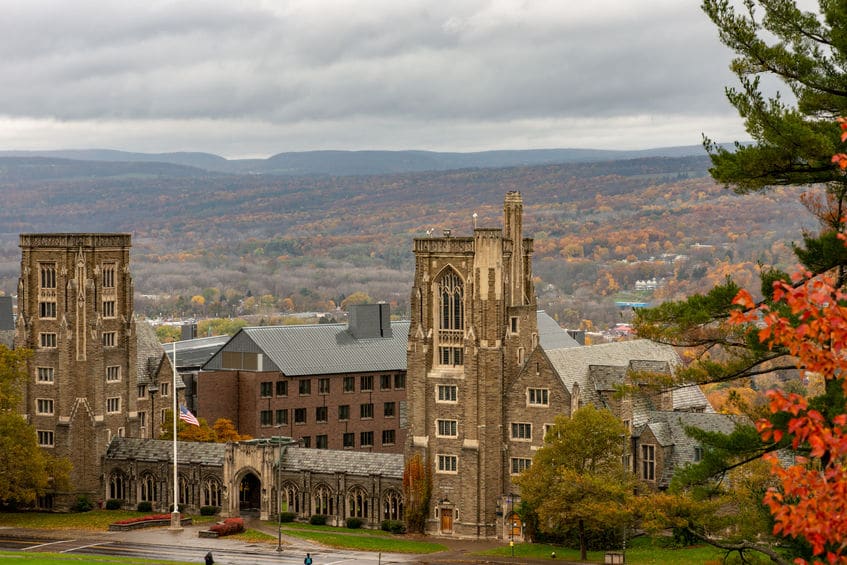
As part of our series How to Fully Fund Your Master’s Degree , here is a list of universities that have fully funded MFA programs in creative writing. A Master’s of Fine Arts in creative writing can lead to a career as a professional writer, in academia, and more.
Fully funded MFA programs in Creative Writing offer a financial aid package for full-time students that includes full tuition remission as well as an annual stipend or salary during the entire program, which for Master’s degrees is usually 1-2 years. Funding usually comes with the expectation that students will teach or complete research in their field of study. Not all universities fully fund their Master’s students, which is why researching the financial aid offerings of many different programs, including small and lesser-known schools both in the U.S. and abroad, is essential.
In addition to listing fully funded Master’s and PhD programs, the ProFellow fellowships database also includes external funding opportunities for graduate school, including fellowships for dissertation research, fieldwork, language study, study abroad, summer work experiences, and professional development.
Would you like to receive the full list of more than 1000+ fully funded Master’s and PhD programs in 60 disciplines? Download the FREE Directory of Fully Funded Graduate Programs and Full Funding Awards !
Here is the list of 53 universities that offer fully-funded MFA programs (Master’s of Fine Arts) in Creative Writing.
University of Alabama (Tuscaloosa, AL): Students admitted to the MFA Program are guaranteed full financial support for up to 4-years. Assistantships include a stipend paid over nine months (currently $14,125), and full payment of up to 15 credit hours of graduate tuition.
University of Arizona (Tucson, AZ): All accepted MFA students receive full funding through a graduate teaching assistantship for 3 years. This package includes tuition remission, health insurance, and a modest stipend (in 2018 it was about $16,100 per academic year).
Arizona State University (Tempe, AZ): 3-year program. All students admitted to the MFA program who submit a complete and approved teaching assistantship application are awarded a TA by the Department of English. Each assistantship carries a three-course per year load and includes a tuition waiver and health insurance in addition to the TA stipend ($18,564 per year). In addition, students have diverse opportunities for additional financial and professional support.
University of Arkansas (Fayetteville, AR): Four-year program. Teaching assistantships currently carry an annual stipend of $13,500 for students with a BA. TAs also receive a waiver of all tuition costs and teach two courses each semester. Nearly all of our accepted students receive TAs. Additionally, the students compete each year for several fellowships.
Boise State University (Boise, Idaho): 3-year fully funded MFA program dedicated to poetry and fiction. All students receive a tuition waiver, health insurance, and a Teaching Assistantship with a stipend of $11,450 per year.
Bowling Green State University (Bowling Green, OH): 2-year program, graduate assistantships (including stipend and scholarship) are available for all eligible face-to-face students. 100% tuition scholarship. Graduate stipend (the 2020-21 stipend is $11,500).
Brown University (Providence, RI): All incoming MFA students received full funding. All graduate students receive a fellowship that pays a monthly stipend and provides tuition remission, the health fee, and health insurance. The stipend for the 2020-2021 academic year is $29,926. Also, students in good standing receive a summer stipend of $2,993.
Boston University (Boston, MA): Tuition costs will be covered for every admitted student for the MFA degree in the BU Creative Writing Program. In addition, admitted students will receive university health insurance while they are enrolled, and all admitted students will receive stipend support of roughly $16,000 for the academic year.
Cornell University (Ithaca, NY): All MFA degree candidates are guaranteed 2 years of funding (including a stipend, a full-tuition fellowship, and student health insurance).
University of California Irvine (Irvine, CA): 3-year program. The Department is committed to providing 3 full years of financial support to all domestic students in the MFA Programs in Writing. Financial support for MFA students is given in the form of Teaching Assistantships providing full tuition coverage as well as University health insurance. Students will earn an estimated $22,569 for the academic year.
University of California San Diego (La Jolla, CA): MFA in Writing students are eligible for financial support if they study full-time, maintain good academic standing and make timely progress toward the degree. All students are eligible for full funding, including international students provided they meet the English language certification requirement for teaching assistants.
University of California Riverside (Riverside, CA): All incoming students are granted a full fellowship and stipend for their first year. After the first year, students receive full tuition and a salary through teaching assistantships.
Florida Atlantic University (Boca Raton, FL): 3-year program. All of the MFA students qualify for a position as a Graduate Teaching Assistant. The GTA position comes with a tuition waiver and a stipend. The standard stipend is $9,000, but some enhanced stipends are available. The Graduate College offers several fellowships for current graduate students.
Florida State University (Tallahassee, FL): The majority of students receive support in the form of a teaching assistantship and are provided with a stipend, a tuition waiver, and a health-insurance subsidy. MFA students receive a three-year assistantship. For 2022-23, MA/MFA stipends will be $16,400, and typically these amounts go up each year. Also, The FSU Graduate School offers several fellowships and awards.
Georgia College & State University (Milledgeville, GA): The MFA Program offers workshops in fiction, creative nonfiction, and poetry, and students take cross-genre workshops. All students admitted to the MFA program receive a Graduate Assistantship for all 3 years that includes a stipend and tuition remission.
University of Houston (Houston, TX): MFA students can receive a teaching assistantship for 3 years. Starting salary for MFAs is $17,935/9 months. Students in the Creative. As part of the assistantship, students are awarded either a Graduate Tuition Fellowship, which remits tuition, or a Creative Writing Program Fellowship, which covers the cost of tuition.
University of Idaho (Moscow, Idaho): All English Teaching Assistants (TA’s) are offered full tuition waivers. Teaching Assistants are given a stipend of $14,000 per year. Also offers three scholarships and three outstanding fellowships to support qualified MFA, graduate students.
University of Illinois, Urbana-Champaign (Urbana, IL): Three-year MFA program. Students accepted into the MFA program will receive full tuition waivers, guaranteed teaching assistantships.
Indiana University (Bloomington, IN): M.F.A. programs offer a generous teaching package to creative writing students. All applicants receive consideration for appropriate fellowships that will carry a stipend of about $19,000, plus tuition and fee-remission that covers roughly 90% of the cost of enrollment.
Iowa State University (Ames, IA): 3-year MFA program. Starting half-time 20 hours per week teaching assistantships for MFA students total $19,250 over 10 months and also receive a full-tuition waiver scholarship (approximate value $10,140) and health insurance coverage. The department has several resources available through which to offer fellowships and scholarships to qualifying new students.
University of Iowa (Iowa City, IA): 2-year residency program. Financial assistance is available for all students enrolled in the program, in the form of teaching assistantships, research assistantships, and fellowships. Most fellowships and assistantships provide either tuition scholarships or full tuition remission.
John Hopkins University (Baltimore, MD): 2-year program. All students receive full tuition, health insurance, and a generous teaching fellowship, currently set at $30,500 per year. Some students work as assistant editors on The Hopkins Review. They often win prizes such as Stegner Fellowships or grants from the National Endowment for the Arts.
University of Maryland (College Park, MD): This 3-year program accepts 8 applicants who are fully funded by Teaching Assistantships for up to three years of graduate study. Our aid packages include a stipend of about $20,000 per academic year and 60 credit hours of tuition remission.
Miami University (Oxford, OH): All students admitted to the MFA program in Creative Writing hold generous Graduate Assistantships (which include a summer stipend). Non-teaching assistantships may also be available.
University of Miami (Coral Gables, FL): An intensive two-year study with a third year option. The James Michener Fellowships and Teaching Assistantships support all our graduate students. Awards include a full tuition waiver and annual stipend of $18,915.
University of Michigan (Ann Arbor, MI): All MFA students accepted into the program are offered a full tuition waiver, a stipend of $23,000/yearly as well as $5,000 in summer funding, and health care benefits. Additionally, various fellowships and prizes are awarded each year to MFA students.
University of Minnesota (Minneapolis, MN): All admitted MFAs receive full funding, in the form of teaching assistantships or fellowships. Teaching assistantships carry a full tuition waiver, health benefits, and a stipend of about $18,600. Also, a variety of fellowships are available for graduate students.
University of Mississippi (University, MS): All of our students are fully funded. We offer two main sources of funding, the Grisham Fellowships and Teaching Assistantships.
University of Nevada Las Vegas (Las Vegas, NV): 3-year program. All MFA students admitted to the Creative Writing International program at UNLV are offered Graduate Assistantship funding of $15,000 per year (which includes in-state tuition and provisions for health insurance).
Northwestern University (Evanston, IL): Funding is provided for 3 full years, summers included. Tuition is covered by a tuition scholarship during any quarter in which you are receiving a stipend.
University of Notre Dame (Notre Dame, IN): Every student admitted to the MFA receives a full-tuition scholarship, a fellowship that carries a full stipend of $16,000 per year and access to a 100% health insurance subsidy.
North Carolina State University (Raleigh, NC): A two-year, fully-funded program, They accept only about a dozen students each year and offer full funding in the form of a graduate teaching assistantship to all eligible admitted applicants.
Ohio State University (Columbus, OH): All admitted students are fully funded for our 3-year MFA program in Creative Writing. In addition, all students receive either a graduate teaching associateship, a Graduate School fellowship or a combination of the two. For graduate teaching associateships, the student receives a stipend of at least $17,000 for the nine-month academic year.
University of Oregon (Eugene OR): A two-year residency MFA program. All incoming MFA students funded with a teaching appointment. Student instructors receive tuition remission, monthly stipends of approximately $18,000.
Oregon State University (Corvallis, OR): All students admitted to the MFA program will automatically receive a standard teaching Graduate Teaching Assistantship contract, which provides full tuition remission and stipend of approximately $12,800 per year to cover living expenses. In addition to tuition remission, all graduate students have the option to receive 89% coverage of health insurance costs for themselves and their dependents.
University of Pittsburgh (Pittsburgh, PA): 3-year MFA program. All students admitted to the program will receive Teaching Assistantships for two or three years. All Teaching Assistantships include salary, medical benefits, and tuition remission.
Rutgers University–Newark (Newark, NJ): Each full-time incoming student receives in-state Tuition Remission and a Chancellor’s Stipend of 15K per year. Students are also eligible for Teaching Assistantships, and Part-Time Lectureships teaching Comp or Creative Writing. Teaching Assistantships are $25,969 (approximate) plus health benefits.
University of South Florida (Tampa, FL): 3-year program. MFA students receive a tuition waiver, a teaching assistantship that comes with a stipend, and enrollment in group health insurance.
Southern Illinois University (Carbondale, IL): Almost all MFA students hold graduate assistantships, which provide stipends for the academic year and full remission of tuition. The annual stipend, which comes with tuition remission, ranges from $13,000 to $14,500.
Syracuse University (Syracuse, NY): Three-Year M.F.A. in Creative Writing. All students are fully funded. Each student admitted receives a full-tuition scholarship in addition to an annual stipend of $17,500.
University of South Carolina (Columbia, SC): 3-year MFA program. The MFA at Carolina is pleased to provide fellowship and/or assistantship funding to all accepted students, earning our program the designation of “fully funded” from Poets and Writers.
University of Tennessee — Knoxville (Knoxville, TN): There is no cost to apply to the MFA program. All of our PhD candidates and MFA students are fully funded, with generous opportunities for additional financial support.
University of Texas in Austin (Austin, TX): All students in the New Writers Project receive three years of full funding through a combination of teaching assistantships (TA), assistant instructorships (AI), and fellowship support. The complete package includes full tuition remission, health insurance, and a salary.
University of Texas James Michener Center (Austin, TX): A three-year, fully funded residency MFA program that provides full and equal funding to every writer. All admitted students receive a fellowship of $29,500 per academic year, plus total coverage of tuition.
Vanderbilt University (Nashville, TN): Each year a small, select class of talented writers of fiction and poetry enroll in Vanderbilt’s three-year, fully-funded MFA Program in Creative Writing. The University Fellowship provides full-tuition benefits, health insurance, and a stipend of $30,000/yearly. In 2nd year and third-year students have the opportunity to teach for one semester.
University of Virginia (Charlottesville, VA): Three-year MFA program. Students will receive fellowship support and/or teaching income in the amount of $20,000 each academic year, as well as full funding of your tuition, enrollment fees, and the health insurance premium for single-person coverage through the university.
Virginia Tech (Blacksburg, VA): Three-year MFA degree offers tracks in Poetry and Fiction, and all students are fully and equally funded via GTA-ships of more than $20,000 per year.
Washington University in St. Louis (St. Louis, MO): Because of selectivity and size they are able to offer all the new students full and equal financial aid for both years in the program in the form of a University Fellowship, which provides a complete tuition waiver plus a stipend sufficient for students to live comfortably in our relatively inexpensive city. All MFA students receive health insurance through Washington University.
Western Kentucky University (Bowling Green, KY): Three-year, fully-funded, residential MFA program in creative writing offering generous assistantships, which will allow MFA students to gain valuable experience tutoring and teaching.
West Virginia University (Morgantown, WV): A three-year program. All Master of Fine Arts students receive a full tuition waiver and an assistantship, which includes a stipend valued at $16,750.
Wichita State University (Wichita, Kansas): Most of the MFA students are GTAs who teach two composition classes each semester. They pay no tuition, receive $4,250 each semester and may buy discounted health insurance. The MFA program also awards two $12,500 fellowships each year.
University of Wisconsin–Madison (Madison, WI): All accepted MFA candidates receive tuition remissions, teaching assistantships, generous health insurance, and other financial support. In addition to the approximately $14,680 paid to each MFA annually in exchange for teaching, every MFA candidate will receive another $9,320 in scholarships each year.
University of Wyoming (Laramie, WY): All of our full-time MFA students are fully funded with two-year graduate assistantships. Currently, assistantships include a stipend of $12,330 per academic year, a tuition and fees waiver, and student health insurance. Students also receive summer stipends of up to $2,000 for the summer.
Would you like to receive the full list of more than 1,000+ fully funded PhD and master’s programs? Get your copy of ProFellow’s FREE Directory of Fully Funded Graduate Programs and Full Funding Awards !
©️ ProFellow, LLC 2021, all rights reserved.
Related Posts:
- Free Workshop! Find 5+ Fully Funded Graduate Programs to Achieve Your Career Goals
- Free Webinar! Find 5+ Fully Funded Graduate Programs to Achieve Your Career Goals
- Fully Funded PhD Programs in School Psychology
- Fully Funded PhD Programs in Health Informatics
- Fully Funded PhD Programs in the United Kingdom
Creative Arts Fellowships , Fully Funded Master's Programs , Writing Fellowships
Why You Should Ignore the News About the “Catastrophic” Academic J...
Benefitting the environment and the economy: the 1 hotels fellowship e..., find and win paid, competitive fellowships.
Be alerted about new fellowship calls for applications, get insider application tips, and learn about fully funded PhD and graduate programs
Fellowship Resources
- Calls for Applications
- Upcoming Fellowship Deadlines
- Fellowships Database
- Interviews with Fellows
- International Fellows Network
- Graduate Funding Directory
Fellowship Tips
- What is a Fellowship?
- Fully Funded Course
- Graduate School Funding
- Fellowship Application Tips
- Fulbright Application Tips
- Fellowship Application Guide
- Our Mission, History & Values
- ProFellow Winner Testimonials
- Fully Funded Course Testimonials
- Fellowship Industry Report
- Advertise With Us
- Terms & Privacy
ProFellow is the go-to source for information on professional and academic fellowships, created by fellows for aspiring fellows.
©2011-2024 ProFellow, LLC. All rights reserved.
- Skip to Content
- Catalog Home
- Creative Writing, MFA

The program in creative writing offers a two-year master of fine arts degree in creative writing in the areas of fiction and poetry. The MFA program is a small program within a large and vibrant writing community. The program typically admits six new students each year.
The MFA program is the only program of its kind to have an "alternating genre" admissions policy. The program admits fiction writers in even-numbered years and poets in odd-numbered years. This alternating admissions schedule allows the program to provide a 2-to-1 student/teacher ratio and lets fiction instructors focus entirely on one group of fiction writers, and poetry instructors on one group of poets for the two-year instructional period.
Please consult the table below for key information about this degree program’s admissions requirements. The program may have more detailed admissions requirements, which can be found below the table or on the program’s website.
Graduate admissions is a two-step process between academic programs and the Graduate School. Applicants must meet the minimum requirements of the Graduate School as well as the program(s). Once you have researched the graduate program(s) you are interested in, apply online .
| Requirements | Detail |
|---|---|
| Fall Deadline | December 15 |
| Spring Deadline | The program does not admit in the spring. |
| Summer Deadline | The program does not admit in the summer. |
| GRE (Graduate Record Examinations) | Not required. |
| English Proficiency Test | Every applicant whose native language is not English, or whose undergraduate instruction was not exclusively in English, must provide an English proficiency test score earned within two years of the anticipated term of enrollment. Refer to the Graduate School: Minimum Requirements for Admission policy: . |
| Other Test(s) (e.g., GMAT, MCAT) | n/a |
| Letters of Recommendation Required | 3 |
Details about the admissions process can be found on the MFA admissions page.
Graduate School Resources
Resources to help you afford graduate study might include assistantships, fellowships, traineeships, and financial aid. Further funding information is available from the Graduate School. Be sure to check with your program for individual policies and restrictions related to funding.
Program Resources
Prospective students should see the program website for funding information.

Minimum Graduate School Requirements
Major requirements.
Review the Graduate School minimum academic progress and degree requirements , in addition to the program requirements listed below.
Mode of Instruction
| Face to Face | Evening/Weekend | Online | Hybrid | Accelerated |
|---|---|---|---|---|
| Yes | No | No | No | No |
Mode of Instruction Definitions
Accelerated: Accelerated programs are offered at a fast pace that condenses the time to completion. Students typically take enough credits aimed at completing the program in a year or two.
Evening/Weekend: Courses meet on the UW–Madison campus only in evenings and/or on weekends to accommodate typical business schedules. Students have the advantages of face-to-face courses with the flexibility to keep work and other life commitments.
Face-to-Face: Courses typically meet during weekdays on the UW-Madison Campus.
Hybrid: These programs combine face-to-face and online learning formats. Contact the program for more specific information.
Online: These programs are offered 100% online. Some programs may require an on-campus orientation or residency experience, but the courses will be facilitated in an online format.
Curricular Requirements
| Requirements | Detail |
|---|---|
| Minimum Credit Requirement | 42 credits |
| Minimum Residence Credit Requirement | 30 credits |
| Minimum Graduate Coursework Requirement | 27 credits must be graduate-level coursework. Refer to the Graduate School: Minimum Graduate Coursework (50%) Requirement policy: . |
| Overall Graduate GPA Requirement | 3.00 GPA required. Refer to the Graduate School: Grade Point Average (GPA) Requirement policy: . |
| Other Grade Requirements | To be considered a student in good standing in the MFA program in creative writing, a student must maintain a cumulative GPA of at least 3.0 and receive no grade lower than an AB in any creative writing course. If a student does not meet this requirement, or if a student receives an F in any course, the student could no longer be considered to be in good standing. Consequently, a student who is not in good standing could have their teaching assistantship or other financial aid support revoked, and could be asked to leave the program. |
| Assessments and Examinations | MFA candidates must submit a publishable written thesis in the genre in which they were admitted (fiction or poetry). |
| Language Requirements | No language requirements. |
Required Courses
| Code | Title | Credits |
|---|---|---|
| Writing Workshops | 9 | |
| Students take workshops in their primary genre (fiction or poetry) which are held in the first, second, and third semesters. Workshops include: | ||
| Graduate Fiction Workshop (Fiction Genre) | ||
| Graduate Poetry Workshop (Poetry Genre) | ||
| Pedagogy (typically during the first semester) | 3 | |
| Creative Writing Pedagogy Seminar (Both Fiction and Poetry Genres) | ||
| Thesis | 15 | |
| MFA Thesis | ||
| Electives | 15 | |
| Total Credits | 42 | |
Students take 3 credits in each of the first, second and third semesters, then 6 thesis credits in the fourth semester. These are not courses—rather, they're the means by which the University gives MFAs credit for their independent writing.
Students take 15 credits of electives drawn from appropriate courses across the curriculum. While students are expected to focus on and produce book-length theses by the end of their two years here, they are also encouraged to pursue other intellectual interests via these electives. In the past, MFA students have fulfilled their elective requirements by enrolling in literature courses, studying foreign languages, pursuing other artistic interests such as dance, book-making, and classical guitar, augmenting research for historical novels by taking appropriate history classes. MFA students may also hone their writing skills in other genres by taking intermediate and advanced undergraduate workshops and graduate level workshops in genres outside the one for which they were admitted, as electives with the permission of the instructor. Students may also take up to 6 elective credits in the form of additional thesis hours in the second and third semesters.
Graduate School Policies
The Graduate School’s Academic Policies and Procedures provide essential information regarding general university policies. Program authority to set degree policies beyond the minimum required by the Graduate School lies with the degree program faculty. Policies set by the academic degree program can be found below.
Major-Specific Policies
Prior coursework, graduate credits earned at other institutions.
With program approval, students are allowed to transfer no more than 12 credits of graduate coursework from other institutions. Coursework earned ten or more years prior to admission to a master’s degree is not allowed to satisfy requirements.
Undergraduate Credits Earned at Other Institutions or UW-Madison
No credits from a UW–Madison or other institution's undergraduate degree are allowed to count toward the degree.
Credits Earned as a Professional Student at UW-Madison (Law, Medicine, Pharmacy, and Veterinary careers)
Refer to the Graduate School: Transfer Credits for Prior Coursework policy.
Credits Earned as a University Special Student at UW–Madison
With program approval, students are allowed to transfer no more than 10 credits of coursework numbered 300 or above taken as a UW–Madison University Special student. Coursework earned ten or more years prior to admission to a master’s degree is not allowed to satisfy requirements.
The MFA advisor (sometimes referred to as the MFA program director) will review student academic performance and conduct in all coursework to determine that students are making satisfactory progress toward the degree. If at any time the MFA advisor determines that a student’s academic performance and/or conduct has not been satisfactory, the MFA advisor, with the input and concurrence of the voting members of the Creative Writing Steering Committee, may place the student on probation or may dismiss the student from the program. The period of probation will be one semester in duration. Prior to the end of the probationary period the MFA advisor will review the student’s performance and conduct and decide, with the input and concurrence of the voting members of the Creative Writing Steering Committee, to reinstate or dismiss the student.
Advisor / Committee
The current MFA advisor (sometimes referred to as the MFA program director) advises all MFA students.
Credits Per Term Allowed
Time limits.
It is expected that the MFA thesis be completed in May of the second year in the program.
Refer to the Graduate School: Time Limits policy.
Grievances and Appeals
These resources may be helpful in addressing your concerns:
- Bias or Hate Reporting
- Graduate Assistantship Policies and Procedures
- Office of the Provost for Faculty and Staff Affairs
- Employee Assistance (for personal counseling and workplace consultation around communication and conflict involving graduate assistants and other employees, post-doctoral students, faculty and staff)
- Employee Disability Resource Office (for qualified employees or applicants with disabilities to have equal employment opportunities)
- Graduate School (for informal advice at any level of review and for official appeals of program/departmental or school/college grievance decisions)
- Office of Compliance (for class harassment and discrimination, including sexual harassment and sexual violence)
- Office Student Assistance and Support (OSAS) (for all students to seek grievance assistance and support)
- Office of Student Conduct and Community Standards (for conflicts involving students)
- Ombuds Office for Faculty and Staff (for employed graduate students and post-docs, as well as faculty and staff)
- Title IX (for concerns about discrimination)
Students should contact the department chair or program director with questions about grievances. They may also contact the L&S Academic Divisional Associate Deans, the L&S Associate Dean for Teaching and Learning Administration, or the L&S Director of Human Resources.
Each student receives financial aid in the form of teaching assistantships, scholarships, tuition remission, and health benefits. Students may also receive prizes or fellowships.
- Professional Development
Take advantage of the Graduate School's professional development resources to build skills, thrive academically, and launch your career.
- Learning Outcomes
- Develop the creative and technical skills necessary to conceive, execute, and revise original literary work in a student's chosen genre (fiction or poetry).
- Demonstrate sensitivity to language and style on both the artistic and technical levels.
- Develop the critical, analytical, and editing skills necessary to evaluate literary works in progress, both in the student’s own work-in-progress, and in that of the student’s peers.
- Develop the ability to read literary works not only for their social, historical, intellectual, formal, and interpretive value, but for their capacity to inspire and generate new work, and to see in a finished work the process of its being made.
- Develop through study and practice the pedagogical skills necessary to teach creative writing courses to undergraduate students.
- Demonstrate understanding of professional and pedagogical practices and opportunities within and related to the field of creative writing.
- Recognize and apply principles of ethical conduct with respect to one's work.
- Engage with local communities of creative writers.
MFA Faculty & Staff
Faculty: Professors Amy Quan Barry, Amaud Jamaul Johnson, Beth Nguyen, and Porter Shreve
Staff: Faculty Associates Sean Bishop and Ron Kuka, Mendota Lecturers Leila Chatti and Dantiel W. Moniz
- Requirements
Contact Information
English College of Letters & Science creativewriting.wisc.edu
Sean Bishop, MFA Program Administrator [email protected] 206-491-1505
Professor Martin Foys, Director of Graduate Studies [email protected]
Graduate School grad.wisc.edu
- /api/
- /pdf/
- Explore Graduate Opportunities
- Explore UW-Madison's Undergraduate Opportunities
- Accounting and Information Systems
- African American Studies
- African Cultural Studies
- Agricultural and Applied Economics
- Agricultural and Life Sciences - College-Wide
- Animal and Dairy Sciences
- Anthropology
- Art History
- Asian Languages and Cultures
- Atmospheric and Oceanic Sciences
- Bacteriology
- Biochemistry
- Biological Systems Engineering
- Biomedical Engineering
- Biostatistics and Medical Informatics
- Business - School-Wide
- Cell and Regenerative Biology
- Chemical and Biological Engineering
- Chicana/o and Latina/o Studies
- Civil and Environmental Engineering
- Civil Society & Community Studies
- Classical and Ancient Near Eastern Studies
- Communication Arts
- Communication Sciences and Disorders
- Community and Environmental Sociology
- Computer Sciences
- Counseling Psychology
- Curriculum and Instruction
- Educational Leadership and Policy Analysis
- Educational Policy Studies
- Educational Psychology
- Electrical and Computer Engineering
- Engineering - College-Wide
- Creative Writing, Doctoral Minor
- English Linguistics, Doctoral Minor
- English, Doctoral Minor
- English, MA
- English, PhD
- Interdisciplinary Theatre Studies, Doctoral Minor
- Interdisciplinary Theatre Studies, MA
- Interdisciplinary Theatre Studies, PhD
- Teaching English to Speakers of Other Languages, Graduate/Professional Certificate
- Food Science
- Forest and Wildlife Ecology
- French and Italian
- Gaylord Nelson Institute for Environmental Studies
- Gender and Women's Studies
- German, Nordic, and Slavic
- Graduate - School-Wide
- Human Ecology - School-Wide
- Industrial and Systems Engineering
- Information School
- Institute for Clinical and Translational Research
- Institute for Regional and International Studies
- Integrative Biology
- Journalism and Mass Communication
- Kinesiology
- La Follette School of Public Affairs
- Language Institute
- Language Sciences
- Law - School-Wide
- Life Sciences Communication
- Management and Human Resources
- Materials Science and Engineering
- Mathematics
- Mead Witter School of Music
- Mechanical Engineering
- Medical Physics
- Medicine and Public Health - School-Wide
- Nuclear Engineering and Engineering Physics
- Nursing - School-Wide
- Nutritional Sciences
- Operations and Information Management
- Pharmacy - School-Wide
- Planning and Landscape Architecture
- Plant and Agroecosystem Sciences
- Plant Pathology
- Political Science
- Population Health Sciences
- Real Estate and Urban Land Economics
- Rehabilitation Psychology and Special Education
- Religious Studies
- Risk and Insurance
- Sandra Rosenbaum School of Social Work
- Soil and Environmental Sciences
- Soil Science
- Spanish and Portuguese
- Veterinary Medicine - School-Wide
- Nondegree/Visiting Student Guide
- Pharmacy Guide
- School of Medicine and Public Health Guide
- Undergraduate Guide
- Veterinary Guide
- Student Life
- Schools & Colleges
- Centers & Institutes
- Leadership Team
- For Faculty and Staff
- For Researchers
- Request Info
- Give to UWM
Creative Writing

The QWERTY keyboard was created in Milwaukee, and so was one of the first graduate programs to grant both the MA and PhD with concentrations in Creative Writing. The former happened downtown, the latter right here on the UWM campus.
Our program is unique; you will hone your craft as you receive a broad-based education that will inform and enhance your artistic vision
While our students generally focus on a particular genre, many of them experiment in multiple genres, seeking to borrow tools from other forms that prove useful to their primary work. Some students have even successfully incorporated multiple genres in their culminating projects.
We admit 10 to 15 new students per year, and we generally have between 40 and 50 graduate-level Creative Writing students in our program. Of these students, approximately one-fourth are working at the MA level and three-fourths are working at the PhD level.
For more information on the Creative Writing Program at UW-Milwaukee, tour the links at left.
Join us: Apply!
Contact person, professor liam callanan [email protected] curtin hall 593, creative writing core faculty.
Creative Writing Supporting Faculty
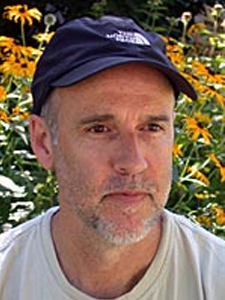
Get the Reddit app
The Unofficial Subreddit of the University of Washington
MFA in Creative Writing at UW Bothell
I'm an international student looking to do an MFA in Creative Writing at UW Bothell. I would describe my GPA as average but my writing samples are strong (I hope I don't come across as a know-it-all, I just like my writing!) I was wondering if anyone here has any experience with the program and if so, what your recommendations would be. Also, as an international student, aside from scholarships I, unfortunately, need to apply for private loans. I've read there are a number of on-campus job opportunities for students, but I was wondering if that was legit.
Thank you in advance for all the answers and help!
Quick links
- Make a Gift
- Directories
MFA Application Checklist
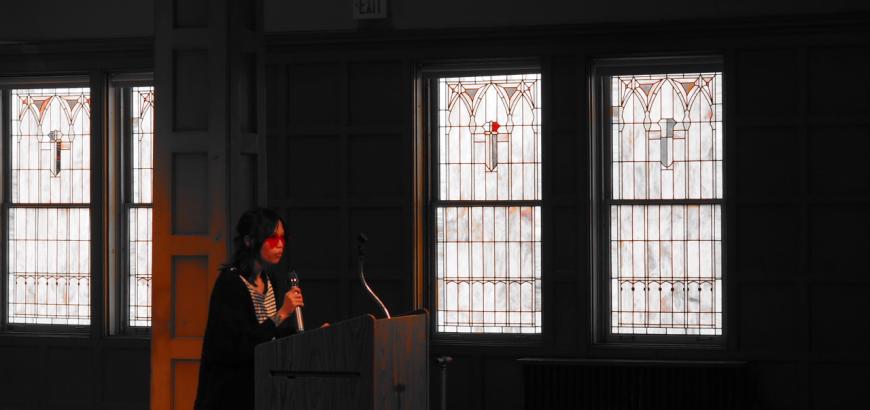
MFA in Creative Writing Application Checklist
- Meet the UW Graduate School's Minimum Admissions Requirements
Unofficial Transcripts from All Colleges or Universities Attended
- Statement of Purpose (500 - 1,000 words)
Critical Writing Sample
Creative writing sample, three letters of recommendation.
- Proof of English Language Proficiency (Non-native English Speakers Only) *We admit students to the MFA program with funding in the form of an Academic Student Employee (ASE) teaching position. Non-native English speakers must meet the requirements listed in the UW Graduate School’s Policy 5.2: Conditions of Appointment for TAs who are not Native Speakers of English in order to be eligible to teach.
For frequently asked questions, please see our MFA FAQ page.
*Effective the Autumn 2021 admissions cycle, GRE General Test scores are no longer required as a part of the application.
The application deadline is January 2. If January 2 falls on a Saturday or Sunday, then the deadline is the following Monday.
***Note: Be sure to select: Creative Writing (MFA) - English - Seattle Campus. You'll need to select either Poetry or Prose. (The UW-Bothell MFA program is independent and located at the Bothell campus.)
For questions about application procedures, please email [email protected] .
Application Materials
One copy of transcripts from each college or university attended, reflecting all graduate and undergraduate coursework is required. This copy will be considered "unofficial," but will suffice for application purposes. If admitted, you will be asked to submit official transcripts (a transcript in a sealed envelope bearing the Registrar's seal) from your degree-granting institution to the University of Washington Graduate School.
Statement of Purpose (500 - 1,000 words)
The statement of purpose is generally between one and two pages long. It indicates some of the intellectual training and background of prospective students, their fields of interest in future English graduate studies, how the program and faculty at the University of Washington is suited to their needs, and what they would hope to bring to the program.
Please address the questions below in your statement of purpose. Keep in mind that there are many ways to answer these questions. The committee is not looking for a particular response, but rather a personal reflection on the link between your background and your work as an artist.
- What are you writing and why?
- What are you passionate about reading and why?
- How has who you are and how you came to writing influenced these interests and passions?
The critical writing sample should be the applicant's best writing, often a revised essay from an undergraduate course or part of a senior project. It is ideal if the paper takes up works or issues identified as areas of interest in the personal statement. There is a great degree of flexibility in regards to the length of the critical paper. This portion of your application can be as short as 8 pages to as long as 25 pages.
A creative writing sample is required for the MFA application. Poets should send 6-10 poems; prose writers should send 10-30 pages of short stories, memoir, personal essays, or a novel.
Use the online application to provide contact information for three people who will submit letters of recommendation by providing their names and email addresses. The most useful recommendations come from college professors familiar with your work as a student. Letters from employers may be helpful if your work was directly related to writing or teaching.
Proof of English Language Proficiency (Non-native English Speakers Only)
Minimum admission requirements: Non-native English speakers must demonstrate English language proficiency in one of the ways listed on the UW Graduate School’s Policy 3.2: Graduate School English Language Proficiency Requirements .
Requirements to hold a TA-ship/ASE teaching position: MFA students interested in an Academic Student Employee (ASE) position must also demonstrate English language proficiency in one of the ways listed on the UW Graduate School’s Policy 5.2: Conditions of Appointment for TAs who are not Native Speakers of English . You must receive a score of at least 26 on the speaking section of TOEFL-iBT or a score of at least 7.0 on the speaking section of the IELTS in order to be eligible to teach.
How to submit official TOEFL scores : Contact the Educational Testing Service (ETS) to order your official TOEFL score report. TOEFL scores are valid for two years from the test date. Our institution code is: 4854. Department code: 99 (any department).
How to submit official IELTS scores : The University of Washington only accepts scores submitted electronically by the IELTS testing center. No paper Test Report Forms will be accepted. All IELTS test centers can report scores electronically. You must request from the center where you took the test that your scores be sent electronically using the IELTS system (E-TRF) to the following address: University of Washington All Campuses, Organisation ID 365, Undergrad & Graduate Admis, Box 355850, Seattle, WA, 98105, United States of America. If you have already taken the IELTS, you can go to the IELTS test center location for the email address of the IELTS Administrator to make your request. Allow a minimum of 13 working days for reporting test results to our school. IELTS scores are valid for two years from the test date.
- Newsletter

- Apply to UW
- Programs & Majors
- Cost & Financial Aid
- Current Students
- UW Libraries
- Online Degrees & Programs
- Degree Plans & Courses
- Advising & Career Services
- UW College of Law
- Honors College
- Academic Affairs
- Geological Museum
- All Colleges
- Campus Recreation
- Campus Maps
- Housing & Dining
- Transit & Parking
- University Store
- Student Organizations
- Campus Activities
- Campus Safety
- Research & Economic Dev.
- Wyoming INBRE
- Neuroscience Center
- Research at AMK Ranch
- Technology Transfer Office
- Supercomputing
- Water Research
- WY EPSCoR/IDeA
- American Heritage Center
- Where We Shine
- About Laramie
- Student Stories
- Campus Fact Book
- UWYO Magazine
- Marketing & Brand Center
- Administrative Resources
- Strategic Plan
- +Application Login
- UW Homepage
- University of Wyoming
- Creative Writing MFA
Creative Writing
Master of fine arts (m.f.a.).
Apply Now Visit Campus
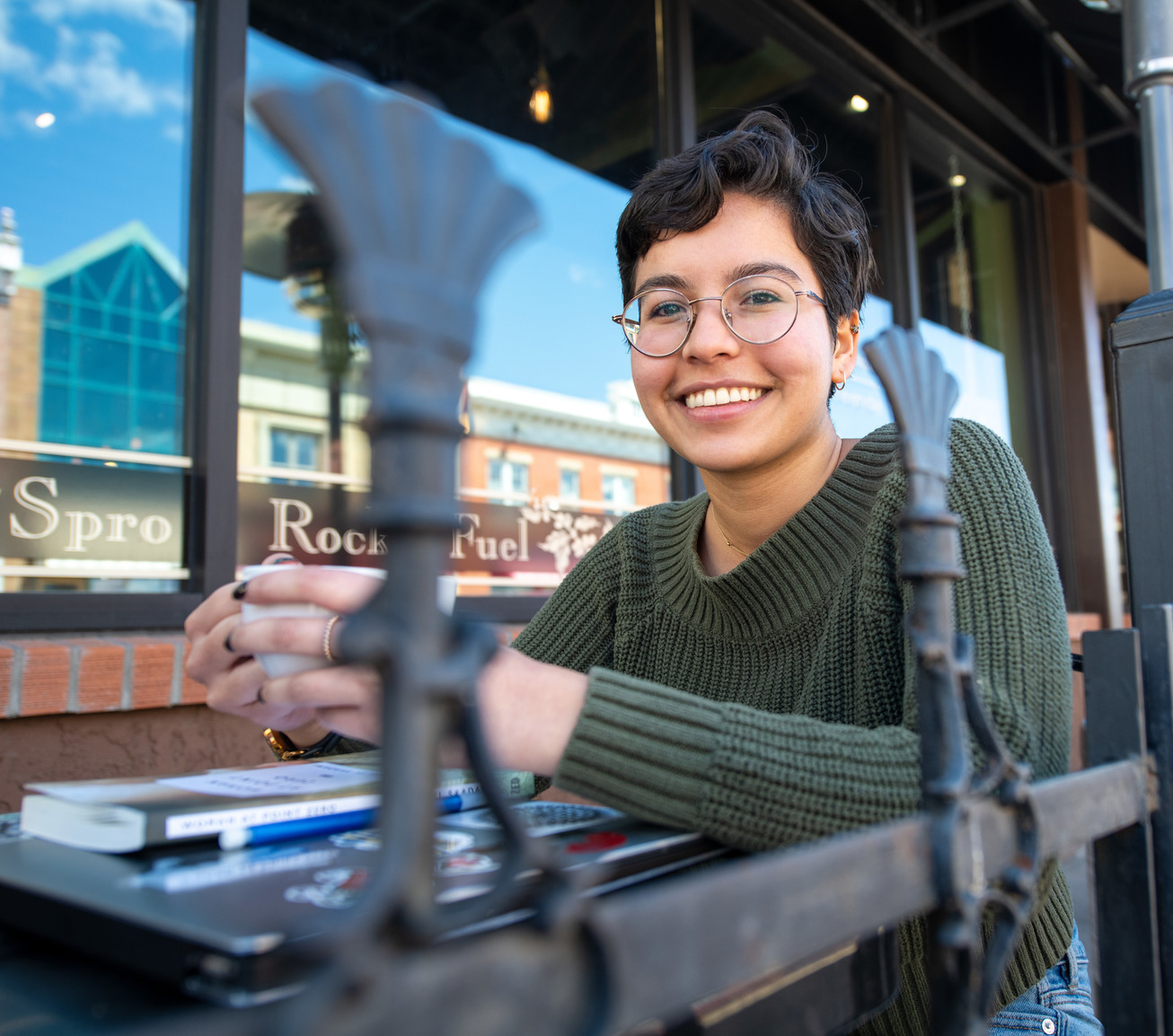
Earn Your MFA at UW
The MFA in Creative Writing at UW provides an intensive course of study in prose—from fiction to nonfiction to hybrid forms. Our interdisciplinary program further develops students’ skills to prepare them for successful careers in writing where their interests are.
With award-winning faculty and experiential learning opportunities, we know our program offers the skills necessary for a fulfilling writing career.
Program Details
Tuition and Fees
Please visit our cost of attendance page
Program Requirements
Curriculum & Courses
College of Arts & Science Creative Writing Program
What is Creative Writing?
Program overview, outstanding faculty.
Admission Requirements
UW is one of the few universities that devote its fully funded MFA program entirely to prose. We offer a wide range of courses and experiential learning opportunities to help our students shine. Ongoing collaborations with literary agents and Wyoming Public Radio provide chances to network and make practical applications from the classroom to the writing desk.
Need to speak with our program coordinator?
Get in touch with us today!
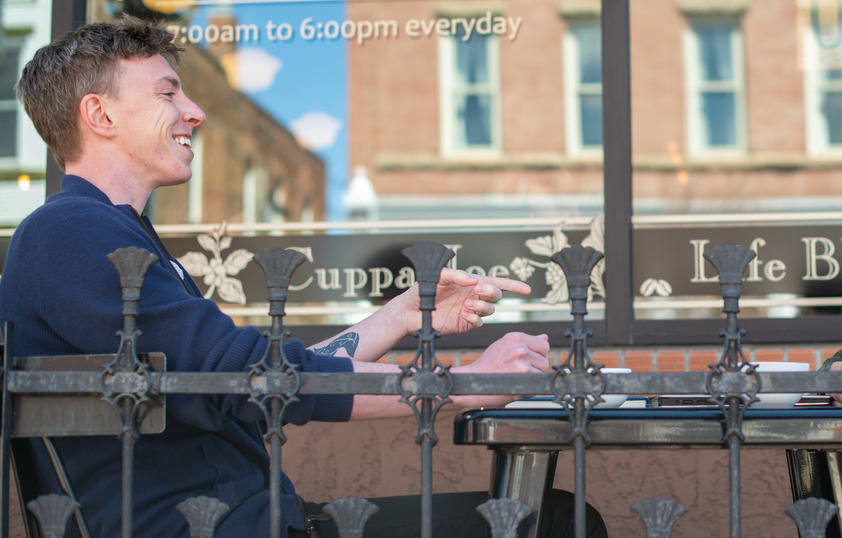
Our faculty practice the writing crafts taught at UW. They write novels, public dialogues and philosophical meditations showing students how life could look post-graduation.
Among our exceptional faculty, Dr. Jeff Lockwood’s mystery series is available at Barnes & Noble, and you can view his TED-Ed, Are locust plagues unstoppable? online . Dr. Harvey Hix received the Fulbright Distinguished Lectureship and most recently published Counterclaims: Poets and Poetries. Students have the opportunity to learn from faculty who have pursued careers in writing and now hold the connections to help aspiring writers succeed.
Creative Writing graduate students take a range of courses over two years, including Practicum in College Teaching, Rhetoric and Composition: History, Theory, Practice and thesis hours.
View all course requirements for Creative Writing.
Students will submit an application and are subject to additional requirements from the Creative Writing Program, including a writing submission.
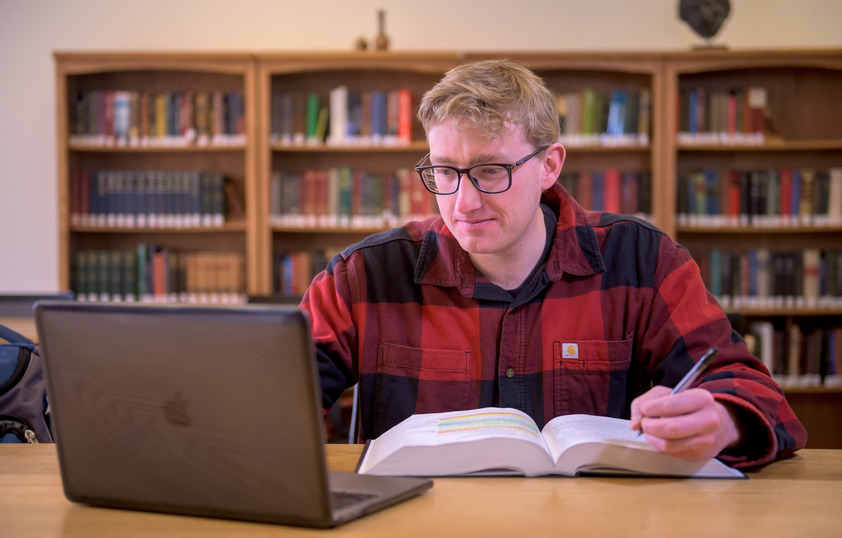
What Can You Do with a Creative Writing Degree?
Writers are experts at creatively wielding their written words to communicate—an important skill employers prioritize in the hiring process. Words can take writers far because long-lasting careers require strong communication. Knowledge of prose can guide graduates through their professional endeavors regardless of the setting.
Creative Writing Careers
- Technical Writer
- Proofreader
- Postsecondary Professor or Instructor
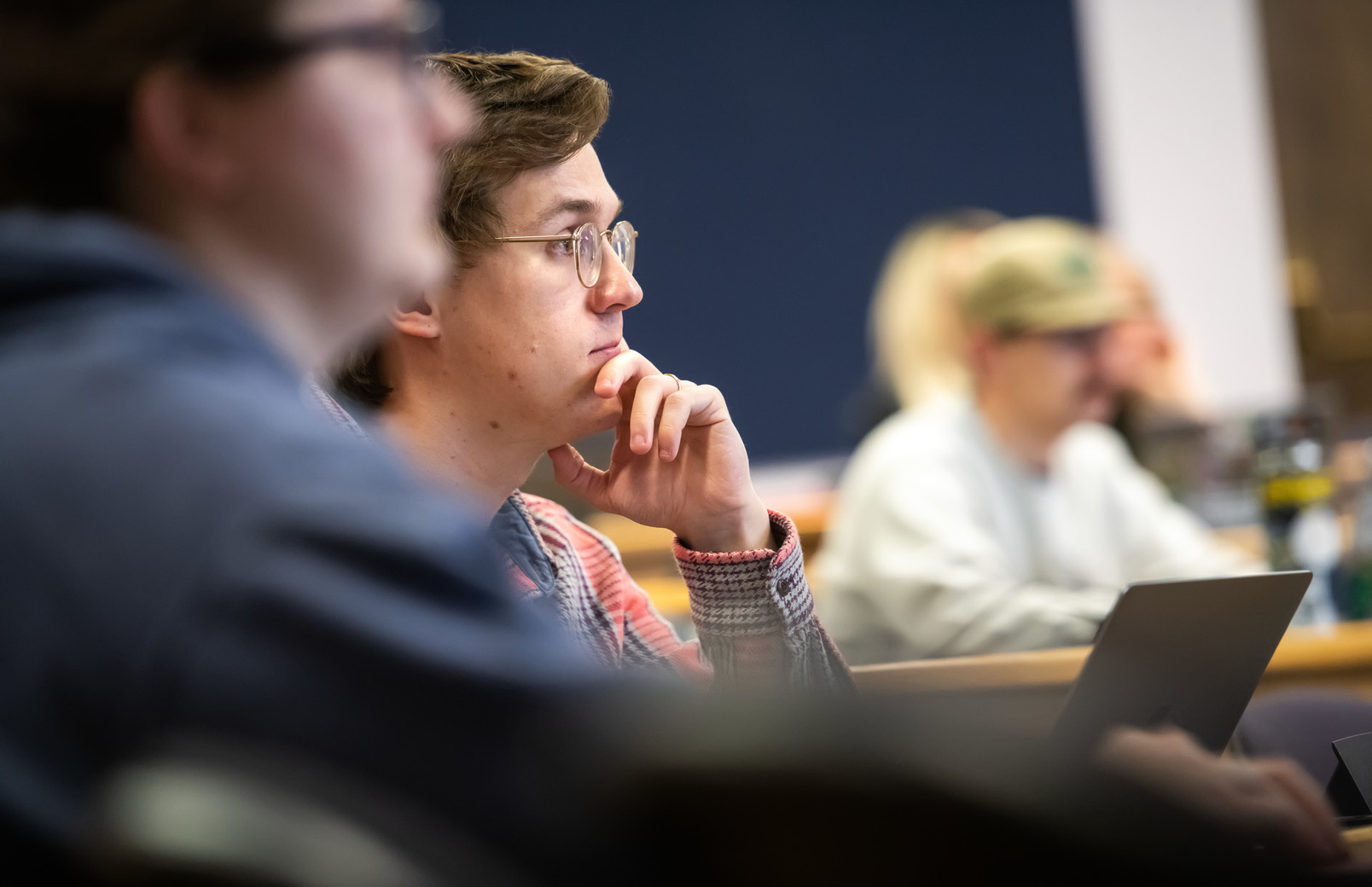
Where UW Alumni are Making a Difference
- Basecamp Strategy
- The Boundary Waters Journal
- Second Harvest Heartland
- Snow College

Creative Writing Program Highlights
Students choose to pursue Creative Writing at UW for several reasons. Joining the program provides access to a variety of resources and benefits aspiring writers are excited to have.
Smaller Class Sizes
UW has all the Creative Writing resources a large state school may offer. However, our small class sizes allow students the chance to encounter more collaborative interactions between peers and professors. Typically we admit 8 new students each year to the MFA program.
Teaching Opportunities
Our students share their knowledge in a variety of positions at UW. These career-enhancing opportunities help develop a firm grasp of Creative Writing by educating others on the subject matter. Teaching is meant to supplement students’ learning but never fill their schedules.
Experiential Learning
Connections with a variety of media outlets at UW grant students the ability to be hands-on. They get to work alongside professionals at organizations like The Owen Wister Review, Western Confluence and Wyoming Public Radio.
Financial Support
Full-time students admitted to the MFA program are funded by a two-year graduate assistantship. Currently, an annual stipend of $12,825, a tuition and fees waiver and student health insurance is included.
In the writing program, we don't put students in competition for funding or for approval. Our workshops stress positive, constructive, open-minded engagement with every student’s work.
Related programs.
Interested in a Creative Writing M.F.A.? You might also want to learn more about these other programs at UW:
- B.A. in English
- M.A. in English
- B.A. in American Studies
- M.A. American Studies
- Creative Writing Minor
We're Eager to Help!
Creative Writing Program
1000 E. University Avenue
Laramie, WY 82071
Phone: (307) 766-3269
Email: [email protected]
- Journals & Series
- Academic Programs
- Composition
- Directories
Quick Links
- Directories Home
- Colleges, Schools, and Departments
- Administrative Units
- Research Centers and Institutes
- Resources and Services
- Employee Directory
- Contact UNLV
- Social Media Directory
- UNLV Mobile Apps
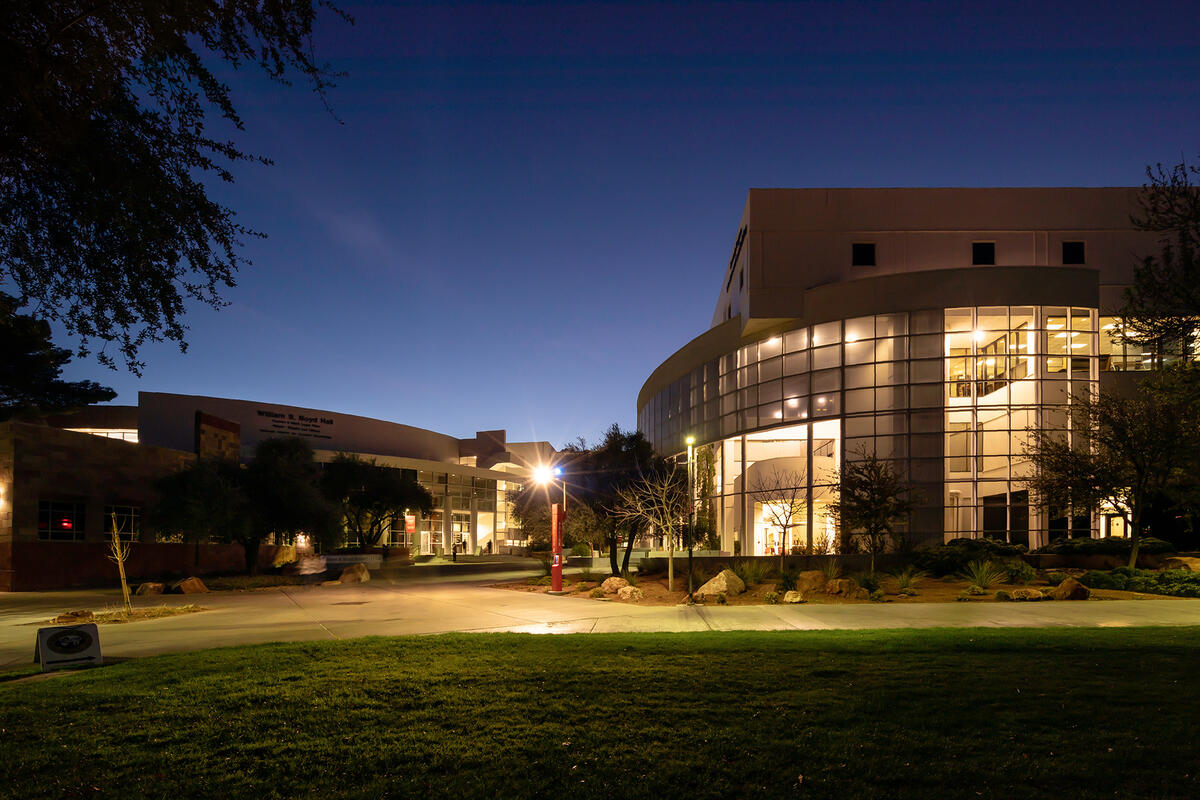
Master of Fine Arts in Creative Writing
Program overview.
Named one of the “Five Innovative/Unique Programs” creative writing programs by The Atlantic , the master of fine arts in creative writing is one of two programs offered by UNLV’s Creative Writing International Program with genre concentrations in fiction, literary nonfiction, and poetry. By providing an innovative curriculum and fostering an educational environment where students can perfect their art, our graduates become globally-engaged writers that demonstrate socially-engaged and active writing practices.
Program Outcomes
Students receive a strong theoretical foundation in their selected genre concentration, as well as an appreciation for the art and theory across various genres, thereby expanding their creative abilities. Moreover, they develop a nuanced understanding of canonical contexts and the historical evolution of literature, which provides valuable insights into new writing. Through exposure to international writing and literary translation, students cultivate a practical appreciation for diverse linguistic traditions beyond English, enriching their creative perspectives.
A high percentage of our graduates have widely published fiction, literary nonfiction, journalism, and poetry with mainstream presses, indie presses, and nationally esteemed venues such as:
- W. W. Norton & Company
- Grove Press
- The Best American Poetry
- McSweeney’s
- The New York Times
- The Los Angeles Times
Program Structure
Our students follow a three-year course of study that includes writing workshops, genre forms courses, literature classes, a residency abroad, completion of a literary translation, and completion of a book-length manuscript that meets the standard of publishable works. Students also have the opportunity for teacher training and practical experience in literary publishing.
Additionally, our department, in partnership with the Black Mountain Institute, offers the Doctorate of Philosophy in English with a Creative Dissertation, supported by a graduate assistantship combined with the Black Mountain Institute fellowship.
Program Funding
All MFA students are fully funded by UNLV and the Black Mountain Institute (BMI) for three years of study towards their degrees.
- Graduate Assistantships of $21,000/year
- Opportunities for additional funding from BMI
- In-state tuition
- Student health insurance.
Duties for the Graduate Assistantship are 20 hours per week, usually fulfilled through a combination of teaching, tutoring in the Writing Center, and working for English Department or Black Mountain Institute publications.
Our Faculty
Maile chapman, ph.d..

Wendy Chen, Ph.D.
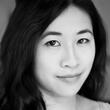
Claudia Keelan

Roberto Lovato
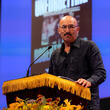
David Morris, MFA

Douglas A. Unger

The MFA Student Experience
The UNLV creative writing program offers a supportive and immersive experience to its students. From day one, students become part of a vibrant community of writers where creativity thrives and collaboration flourishes. Whether students aspire to publish their writing, pursue further study, or embark on diverse career paths within the literary world, UNLV provides the resources, support, and community they need to thrive and succeed.
Activities and Events With the Black Mountain Institute
The UNLV Department of English has a longstanding relationship with the Beverly Rogers, Carol C. Harter Black Mountain Institute (BMI). This allows our students to receive opportunities to engage in creative and literary activities with visiting BMI fellows in socially meaningful literary events for the city of Las Vegas and its greater community. Recent BMI fellows and national and international award-winning visitors include:
- Percival Everett
- Melissa Febos
- Layli Long Soldier
- Jaquira Díaz
- Nana Kwame Adjei-Brenyah
See the Black Mountain Institute's website for more information.
Academic and Literary Journals
The creative writing concentration helps students develop their writing craft and critical thinking skills through a workshop setting and literature courses. It equips them with professional skills for various industries and prepares them for graduate studies in English and creative writing.
Founded by M.F.A. alumna Kat Kruse in 2010, Neon Lit is a completely student-run reading series featuring writing of students currently in the Creative Writing programs at UNLV. Events are held on the last Friday of each month usually at the Writer’s Block, an independent bookstore and community center in downtown Las Vegas. See Neon Lit’s website and YouTube Channel for more information.
Writing Series
Breakout writers series.
The “Breakout Writers Series” or Emerging Writers Series features writers just emerging on the literary scene. Writers who visit and read for this series are chosen entirely by the students in the M.F.A. and Ph.D. programs.
Alumni Reading Series
The yearly Alumni Reading Series celebrates the literary successes of graduates of the program. Recent alumni readers include Marianne Chan, Jean Chen Ho, Clancy McGilligan, Alissa Nutting, Juan Martínez, Sasha Steensen, and Mani Rao.
Admission Requirements
- Fiction: 20-30 pages
- Literary nonfiction: 20-30 pages
- Poetry: 10-15 pages
- A letter of application to the Graduate Committee detailing a statement of purpose and reasons for choosing UNLV
- Official transcripts from all previously attended colleges or universities
- Two letters of recommendation
Applicants must choose the International Focus subplan, unless they have already been accepted to the Peace Corps Master's International Partnership program.
International Applicants
Each year, our program admits several international writers with high competency in writing in English that immensely contribute to our literary community. Our diverse student body fosters a rich exchange of ideas and perspectives, creating a dynamic learning environment that prepares graduates for success in the global literary landscape. Furthermore, UNLV's creative writing program values inclusivity and encourages applicants from diverse backgrounds and life experiences to contribute to the vibrant tapestry of voices within our community.
Applying for a Poetry or Fiction Fellowship
The application period for the WICW Poetry and Fiction Fellowships is changing in 2024! Beginning this year, applications will open on November 1, 2024, with a deadline of January 1, 2025. Please note this change in your calendars.
Each year, the WICW Poetry and Fiction Fellowships award stipends of at least $40,000 and generous health benefits, to five emerging writers of poetry and fiction. The submission deadline is January 1. Please read our instructions and eligibility requirements, below, before clicking here to upload your application .
To be eligible, applicants must have completed or be scheduled to complete an MFA or PhD in Creative Writing by August 15 of the fellowship year (at least one week before the fellowship would begin). Eligible applicants may have published no more than one full-length collection or book of poetry, fiction, or creative nonfiction as of the March 1 deadline. Individuals who have never published a full-length collection or book remain eligible, of course. Successful applicants must commit to reside in the Madison area for the full duration of the Fellowship from mid-August to mid-May (holiday and other travel are of course permitted); to teach one section of undergraduate mixed-genre or single-genre creative writing each semester; to hold no other teaching, graduate study or fellowship obligations; to assist in the selection of the following year’s Wisconsin Institute for Creative Writing Fellowships; and in general to participate fully in the life of the Madison writing community during the fellowship period. For more details regarding the responsibilities and privileges of our fellows, please see the main fellowships page .
Applicants should prepare the following materials before applying :
- A $50.00 Application Fee, paid online by credit card.
- A resume or curriculum vitae, concluding with the names, phone numbers, and email addresses of two recommenders.
- A writing sample consisting of either 10 pages of poetry (single-spaced and uploaded as a pdf) or up to 30 pages of fiction (double-spaced and uploaded as a pdf). Fiction applications must consist of either one short story or a novel excerpt. Your name must not appear anywhere on your manuscript , and while previously published work may be submitted, your manuscript must in no way indicate that your work has been published.
Do not include more than one genre in a single submission. You may apply in more than one of our fellowship genres, but you must upload a separate application for each, with separate application fees. If you are submitting short fiction, please do not send more than one short story. The limit is one story no matter how short that story may be. If you send more than one story, we will only read the first. If you are sending a novel excerpt you may (but need not) include a brief synopsis (one or two paragraphs) of the novel, as page one of the manuscript.
The poetry and fiction fellows will be chosen by May 1 each year, and announced on the fellows page . If you have questions concerning these fellowships that are not answered in the FAQ below, please contact Sean Bishop and Ron Kuka, Administrators of the Wisconsin Institute for Creative Writing, at [email protected] .

Wisconsin Institute Alumni Spotlight: Jaquira Díaz
Jaquira Díaz was born in Puerto Rico and raised in Miami. She is the author of Ordinary Girls: A Memoir, winner of a Whiting Award, a Florida Book Awards Gold Medal, and a Lambda Literary Awards finalist. Ordinary Girls was an Indies Introduce Selection, a Barnes & Noble Discover Great New Writers Notable Selection, an Indie Next Pick, and a Library Reads pick. Díaz's work has been published in The Guardian, Time Magazine, T: The New York Times Style Magazine, and The Best American Essays 2016, among other publications. She is the recipient of two Pushcart Prizes, an Elizabeth George Foundation grant, and fellowships from the MacDowell Colony, the Kenyon Review, and the Wisconsin Institute for Creative Writing.
Her second book, I Am Deliberate: A Novel, is forthcoming from Algonquin Books. She is Assistant Professor in the MFA Creative Writing Program at Colorado State University.

Fellowship FAQ
Required Degree
- Q: I don’t have an MFA in Creative Writing, but I am a serious writer with a record of publications. May I apply for a fellowship? A: Unfortunately, no. To be eligible for a Wisconsin Institute for Creative Writing fellowship, you must have completed an MFA or PhD in Creative Writing by August 15th of the fellowship year. For those who pursued a graduate degree in creative writing outside the USA or Canada, in a country where an MA in Creative Writing (rather than an MFA) is the standard terminal degree, we will except the MA rather than the MFA. But all applicants must have completed a graduate degree in creative writing, regardless of their publication records or other special circumstances.
- Q: I have a graduate degree in a field other than creative writing. Am I eligible for a fellowship? A: Again, we have to say no. This question is usually asked by persons holding PhDs in other fields. Unfortunately, we are not able to award fellowships to persons with PhDs in any other area, including English literature, composition, theater, or other areas of English or theater studies. Even if you have a PhD in English, took graduate-level writing workshops, and wrote a creative dissertation, we still cannot offer you a fellowship if your PhD is not specifically in creative writing.
- Q: May I apply for a fellowship if I have an MA in creative writing? A: Only if you pursued your MA outside the USA or Canada, in a country where an MA in Creative Writing is the standard terminal degree. Since the MFA and Ph.D. in Creative Writing are co-terminal degrees in North America, we only accept those degrees from applicants who completed their graduate degrees in the US, Mexico, or Canada.
Previous Books
- Q: Am I eligible if I have already published a novel or a full-length collection of poetry, short stories, or creative nonfiction? A: Yes. We allow applicants to have published or have forthcoming one full-length book of creative writing prior to the application deadline. If you have published more than one book by that deadline, however, you are not eligible.
- Q: I have not published a book-length collection. Am I still eligible? Should I bother applying? A: Yes! Our reading process is anonymous; most of our fellows will not have published a collection prior to being selected. Since we opened the fellowships to applicants with one book in 2012, the majority of our fellows have not published or sold a book-length work prior to their acceptance.
- Q: I’ve published more than one book that is neither fiction, nor poetry, nor creative nonfiction ( e.g. a cookbook, a car repair manual, or an ESL textbook). Am I eligible for the fellowship? A: Yes. Books that are not creative writing do not count for fellowship purposes. If you are unsure if your book is considered a creative work, feel free to contact us .
- Q: In addition to one collection of creative work, I’ve edited an anthology. Am I eligible for the fellowship? A: Yes.
- Q: Am I still eligible if I published one full-length book of creative writing, plus one or more chapbooks? A: Yes. A chapbook is not considered a book for fellowship purposes. However, please note that we regard any poetry collection exceeding 45 pages to be a full-length manuscript, even if the press labels it a “chapbook.”
- Q: If I’ve published more than one full-length book of creative writing, but in two or more different genres, may I still apply for a fellowship? A: No. Since the fellowship is provided to give writers time to work on a first or second book of creative work, you are no longer eligible to apply, even though your books were in different genres.
Writing Sample (fiction and poetry fellowships only)
- Q: May I submit a slightly longer writing sample than the rules permit? A: No. Additional material beyond the stated page limits will not be read.
- Q: If I write very short stories, may I send more than one? May I upload two 15-page stories instead of one 30-page story? A: No to both questions. You may submit only one short story, no matter how short, even if that means you are sending fewer than 30 pages of work. If you send more than one story, only the first will be read.
- Q: You say each poem must begin on a new page. What do I do about a poem that won’t fit on just one page? A: Sorry for the confusion here. You may, of course, continue the poem on as many pages as necessary. You may, for example, submit a single 10-page poem, or two 5-page poems, or five 2-page poems. What we are asking is that each new poem should begin on a new page.
- Q: May I upload/e-mail additional material, or substitute another story, or otherwise update my application at a later date? A: No. Only the original material submitted with the application will be considered.
Selection Process (fiction and poetry fellowships only)
- Q: Could you give me an idea of how you go about selecting your poetry and fiction fellows? A: Sure. Submittable applications are made anonymous to everyone but the Program Administrators; only the writing samples themselves are visible to the committee. The anonymous fiction manuscripts are assigned to a panel of fiction judges, and the anonymous poetry manuscripts are assigned to a panel of poetry judges. The judges then read and evaluate the manuscripts, narrowing down the field until each panel has selected the fellowship recipients and several alternates. Judges who recognize work by former students or close personal acquaintances recuse themselves with respect to that work. Only after the judges have chosen and ranked the best manuscripts are those selected manuscripts matched up with the applicants’ other materials. This is the first time the judges learn the names of, and other information about, the winners and alternates.
- Q: Who are the judges? A: The exact composition of the fiction and poetry panels changes from year to year, but panels always consist of members of the creative writing faculty, as well as current and former Institute fellows. There are at least five judges on each final committee.
- Q: When and how will you let me know your decision? A: We make our decisions and email or phone the selected poetry, fiction, and HEAF fellows by May 1. As soon as we have all of our acceptances we post the names of our new fellows on this website and notify other applicants via e-mail of our selections.
- Q: Is there a certain style of writing you favor? A: While selecting the fellows is a subjective process in which personal taste plays a large role, we do not intentionally restrict ourselves to certain styles of writing (as you will see from the aesthetic range of fellows throughout our history ). Because the composition of our selection panel changes annually, it is hard to predict what kind of work will speak to a panel in a given year. All we can suggest is that you send in what you believe to be your very best work.
- Q: Do I have to indicate which of the fellowships I’m applying for ( e.g. if I’m applying for a poetry fellowship, do I have to specify whether I’m applying for a Halls or a Wallace fellowship)? A: No. The Institute will assign the fellowships; all you have to do is let us know the genre in which you’re applying.

IMAGES
VIDEO
COMMENTS
The MFA is designed to be completed within six full-time quarters (two academic years). MFA students can refer to the MFA Degree Requirements and MFA Program Guide. Land Acknowledgement. The Creative Writing Program acknowledges that the University of Washington, like all of our businesses, institutions and our lives, exists on Indigenous land.
The University of Washington English Department's Creative Writing Program offers a BA in English with a concentration in Creative Writing and a two-year Master of Fine Arts degrees in Poetry and Prose.. Founded in 1947 by Theodore Roethke, the Creative Writing Program's tradition of transformative workshops continues with our current faculty: David Bosworth, Nikki David Crouse, Rae Paris ...
MFA alum Troy Landrum Jr. selected as Wa Na Wari Fellow. $82,300 *. Average annual salary for writers and authors in Washington state in 2022. 37% *. Projected annual job growth for writers and authors in Washington state (2020-30), which is much faster-than-average job growth. * Source: O*Net Online.
Founded in 2002, the Graduate Program in Creative Writing offers a two-year Master of Fine Arts Degree in the areas of fiction and poetry. Though small—we typically admit six new students each year—the MFA is just one part of a vibrant writing community including five post-graduate fellows, former fellows and alums, PhD candidates in contemporary…
Writing Changes The Master of Fine Arts in Creative Writing & Poetics at the University of Washington Bothell is dedicated to helping each student develop their creative work through a course of study that encourages exploration and discovery. We organize our curriculum into areas of inquiry rather than genres. In contrast to many MFA programs,...
Inquire into the social, cultural and technological aspects of the written arts at this historic moment. Study with nationally and internationally recognized writers and artists, and earn your MFA. For more information, see the UW Bothell Master of Fine Arts in Creative Writing & Poetics website.
The MFA in Creative Writing at Washington University in St. Louis is a program on the move: applicants have almost doubled here in the last five years. Maybe this sudden growth of interest comes from recent rising star alumni on the literary scene, like Paul Tran, Miranda Popkey, and National Book Award winner Justin Phillip Reed. ...
MFA in Creative Writing & Poetics - University of Washington Bothell, Bothell, Washington. 637 likes · 8 were here. Applications are now open for the MFA in Creative Writing & Poetics: an innovative...
R.E. Hawley (MFA in fiction) is a writer and graphic designer. Her essays and cultural criticism have appeared in The New York Times, The New Yorker, The Atlantic, Gawker, and other publications. Currently, she is an MFA candidate in fiction at the University of Wisconsin-Madison. Previously, she served as the creative lead of The Chicago Reader.
Welcome to the University of Wisconsin-Madison's Program in Creative Writing. We offer courses in fiction, poetry, creative nonfiction, and playwriting to students at both the undergraduate and graduate levels. Since 1986, we have also been host to the Wisconsin Institute for Creative Writing's post-graduate fellowships, which provide top emerging writers a year to develop their craft.
All MFA students receive health insurance through Washington University. Western Kentucky University (Bowling Green, KY): Three-year, fully-funded, residential MFA program in creative writing offering generous assistantships, which will allow MFA students to gain valuable experience tutoring and teaching.
For questions about the MFA program, please contact [email protected]. Master of Fine Arts in Creative Writing Course Requirements. 55 credits, a creative manuscript, and a critical essay. The program should be completed within six full-time quarters. 20 course credits in creative writing workshops (one may be outside the student's genre)
We offer a funding package to all admitted MFA students. The funding package includes a tuition waiver, health insurance, and a monthly stipend for two academic years, contingent on satisfactory academic progress and performance of duties. Funding includes a combination of teaching and fellowship quarters.
The program in creative writing offers a two-year master of fine arts degree in creative writing in the areas of fiction and poetry. The MFA program is a small program within a large and vibrant writing community. ... Evening/Weekend: Courses meet on the UW-Madison campus only in evenings and/or on weekends to accommodate typical business ...
MFA in Creative Writing Program Guide. Whether focusing on poetry, fiction, or nonfiction, a creative writing degree prepares students for a multitude of career options. Spanning two years, a master of fine arts (MFA) program trains you to become a skilled writer, communicator, and editor who can receive and apply feedback effectively.
Creative Writing. The QWERTY keyboard was created in Milwaukee, and so was one of the first graduate programs to grant both the MA and PhD with concentrations in Creative Writing. The former happened downtown, the latter right here on the UWM campus. Our program is unique; you will hone your craft as you receive a broad-based education that ...
MFA Teaching Opportunities. In addition to full tuition remission, faculty-level health insurance, and other direct financial support, all MFA candidates have the opportunity to teach one section of "ENGL 207: Intro to Creative Writing" each semester of their first year. The program provides significant pedagogical support from the get-go ...
Our list of 256 MFA programs for creative writers includes essential information about low-residency and full-residency graduate creative writing programs in the United States and other English-speaking countries to help you decide where to apply. It also includes MA programs and PhD programs.
Hey all, I'm an international student looking to do an MFA in Creative Writing at UW Bothell. I would describe my GPA as average but my writing samples are strong (I hope I don't come across as a know-it-all, I just like my writing!) I was wondering if anyone here has any experience with the program and if so, what your recommendations would be.
Allow a minimum of 13 working days for reporting test results to our school. IELTS scores are valid for two years from the test date. MFA in Creative Writing Application Checklist Meet the UW Graduate School's Minimum Admissions Requirements Unofficial Transcripts from All Colleges or Universities Attended Statement of Purpose (500 - 1,000 ...
The MFA in Creative Writing at UW provides an intensive course of study in prose—from fiction to nonfiction to hybrid forms. Our interdisciplinary program further develops students' skills to prepare them for successful careers in writing where their interests are. With award-winning faculty and experiential learning opportunities, we know ...
FACULTY EMERIT. Jesse Lee Kercheval, Zona Gale Professor of English Emerit (retired) was the founding director of the MFA Program in Creative Writing and Director of the Wisconsin Institute for Creative Writing from 1994-2010. She is the author of the 15 books of poetry, fiction and nonfiction in English. Her most recent title is the poetry ...
Program Overview. Named one of the "Five Innovative/Unique Programs" creative writing programs by The Atlantic, the master of fine arts in creative writing is one of two programs offered by UNLV's Creative Writing International Program with genre concentrations in fiction, literary nonfiction, and poetry.By providing an innovative curriculum and fostering an educational environment where ...
To be eligible for a Wisconsin Institute for Creative Writing fellowship, you must have completed an MFA or PhD in Creative Writing by August 15th of the fellowship year. For those who pursued a graduate degree in creative writing outside the USA or Canada, in a country where an MA in Creative Writing (rather than an MFA) is the standard ...